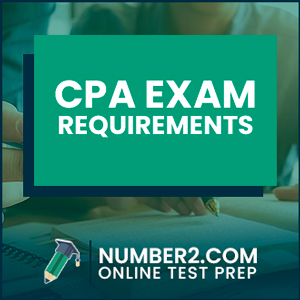 What Are The Requirements to Take the CPA Exam?
What Are The Requirements to Take the CPA Exam?
Before you can register to take the uniform Certified Public Accountants examination, you must meet some eligibility requirements.
Every state sets different requirements that candidates must meet to be eligible to take the CPA exam, but most jurisdictions require similar qualifications. That’s why you should check with your respective state to ensure that you are eligible before starting your application process. This way, you increase your chances of acceptance to take and pass the exam.
The last thing you want is for your state to reject your application simply for failing to meet the basic requirements or for making avoidable errors in your exam application.
Let’s walk through the CPA exam requirements that you will have to complete in order to sit for the CPA exam in your state.
CPA Exam Requirements & Qualifications
Although each State Board has unique requirements for candidates, most states require CPA candidates to meet eligibility qualifications in the following areas:
- US Citizenship
- State Residency
- Social Security Identification
- Minimum Age Requirements
- Education Requirements
- Work Experience Requirements
These main categories vary among states, but most have some basic requirement in these areas. Let’s take a look at each to see if you qualify for the exam.
1. US Citizenship
This is one of the most important CPA exam requirements that candidates must be aware of. Since the Certified Public Accountant designation is a US credential, it makes sense that many states require US citizenship in order to take the exam. This is not good for international candidates, however.
There are a few states such as North Carolina, Hawaii, Louisiana, and Alabama that do not consider the citizenship of the candidates when qualifying them for the exam. Such states are especially preferred for international candidates to take the exam.
Even though you may be qualified to take the examination without meeting the citizenship requirements, most states are likely to have additional requirements for certification and licensing after you have passed the four CPA exam sections.
2. State Residency
You might meet the US citizenship requirements, but various CPA state boards will have an array of other specific requirements that you should meet, especially state residency. Save for a few states such as Maryland, Kansas, and Louisiana; other states do not consider state residency.
Candidates interested in taking the exam in specific states but do not meet the residency requirement can still meet this requirement by proving that they have stayed in the state for not less than six months, have been employed, or share evidence of a physical address within the state. This is especially true for college students who attended college in a different state than they grew up.
Note that the state residency will be helpful when choosing the CPA exam center that is convenient to you.
3. Social Security Identification
Do you need a Social Security number to take the CPA exam? Most states require CPA candidates to have a valid Social Security number to sit for the exam.
The need for a social security identification number is closely related to the citizenship and state residency requirements. It is, however, not a mandatory requirement in several states like Illinois, Montana, South Dakota, Wisconsin, and New York.
By default, most candidates based in the US will have a social security number, making it easier for them to meet this requirement. However, international students can avoid the hassle of pursuing the SSN by simply applying in the above states that do not require it.
4. Minimum Age Requirements
How old should you be before you can apply and take CPA examinations? Well, almost all states have set the minimum age for taking the exam at 18 years. This leaves out minors who are yet to meet this age requirement.
It is argued that the age restriction is linked to other requirements such as proof of state residency, citizenship, and social security identifications, which are only issued to legal adults.
Minors interested in pursuing the CPA exam are free to study at their own pace but will only be allowed to register upon attaining the minimum age.
5. Education Requirements
Despite the existence of the first four requirements, most candidates do not pay much attention to them as they tend to focus more on the educational requirements. Even though the minimum academic requirements vary from one state to another, there are some constants that cut across the 55 states.
All states only accept candidates with at least a bachelor’s degree or 120 credit hours from an accredited university or college. However, the coursework should include not less than 24 accounting credits. Save for Massachusetts, Maine, Hawaii, Alaska, and Georgia, a degree in accounting is required.
Some states demand 150 semester hours or an equivalent of a master’s degree to take the exam and get the CPA license. In fact, only Virgin Island does not consider the 150-hour rule as a pre-licensure requirement.
Candidates with degrees from other fields other than accounting are required to have pursued a certain number of accounting and business courses. International candidates or those who pursued their degree courses outside the United States should check with the respective state boards to determine whether their credentials meet the basic academic qualifications.
Note that most states will only allow candidates that have already graduated upon meeting the 120 or 150 credit hours to take the CPA exam. However, there are a few states like New York, Arizona, and California that may allow candidates that are on course towards meeting this requirement, especially having completed specific accounting and business coursework and almost guaranteed of graduating to take the CPA exam.
You just need to check with your state board to know if this applies.
6. Work Experience Requirements
Do you need to have some work experience to take the CPA exam? No. This is no work experience requirement to take the CPA exam in all 55 testing jurisdictions. So long as all the requirements have been met by a candidate, then they are eligible.
However, most states only license candidates with at least two years of experience in public accounting or auditing. Some states will also license candidates with non-public accounting experience only that the acceptable number of years is higher when compared to those in public accounting.
It is important to understand the distinction between CPA exam requirements and licensing requirements. You may take and pass the exam, but that does not automatically guarantee a license.
Some states practice a one-tier system where the license and certificate are only issued to candidates who meet both academic and work experience requirements. Others have a two-tier system where a certificate is issued once you pass the four sections of CPA and a license later upon meeting the experience requirements.
Why Are These Requirements Necessary?
Professional certification bodies are trying their best to ensure that only qualified and competent professionals are allowed to practice. Accounting is a noble profession that requires passion and integrity.
Tax laws keep changing, requiring the professionals to be dynamic to keep their clients or employers compliant. The staffing needs of most employers and their expectations are equally diverse as they try out new models of doing business. It is therefore important that only the best candidates get the chance to take the exams and get certified.
What to do if My CPA Application is Rejected by the State Board?
It is unlikely that you will be rejected by the state board to take CPA if you meet the basic requirements. However, some avoidable errors can contribute to the rejection. To avoid this, take your time to go through your state board’s instructions and ensure that you tick all the boxes.
If you are an international candidate, do not forget to have your transcripts validated. Missing, wrong, or incomplete information are major contributors to the rejection of most applications. Note that the application fee is non-refundable. To avoid this, be thorough to guarantee acceptance.
CPA Exam Requirements by State
Since every state has slightly different exam requirements, it’s important to check with your state board to make sure you meet the specific qualifications where you plan to get licensed.
Here is a list of state CPA exam requirements. Click your state to get started.
- Alabama
- Alaska
- Arizona
- Arkansas
- California
- Colorado
- Connecticut
- Delaware
- Florida
- Georgia
- Hawaii
- Idaho
- Illinois
- Indiana
- Iowa
- Kansas
- Kentucky
- Louisiana
- Maine
- Maryland
- Massachusetts
- Michigan
- Minnesota
- Mississippi
- Missouri
- Montana
- Nebraska
- Nevada
- New Hampshire
- New Jersey
- New Mexico
- New York
- North Carolina
- North Dakota
- Ohio
- Oklahoma
- Oregon
- Pennsylvania
- Rhode Island
- South Carolina
- South Dakota
- Tennessee
- Texas
- Utah
- Vermont
- Virginia
- Washington
- Washington, DC
- West Virginia
- Wisconsin
- Wyoming
Are You Eligible to Take the CPA Exam?
That’s a full list of the the exam qualifications. If you meet all of the requirements, you can start your CPA application process now. But before you do that, make sure you are ready to take the exam.
The best way to prepare for any section is by having a complete study guide to help you learn and memorize all of the key topics tested on the exam. There’s no way to know everything, so you’ll need a guide to that matches your study style to help you ace the exam. Don’t wait. Get started now!

